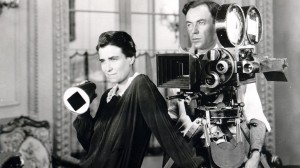 Fifteen women. One hundred years. That’s the terrain covered in 52 minutes in “Makers: Women in Hollywood,” a new documentary produced by Rory Kennedy and co-produced and directed by Linda Goldstein Knowlton, airing on PBS and available in an extended version on AOL.
Fifteen women. One hundred years. That’s the terrain covered in 52 minutes in “Makers: Women in Hollywood,” a new documentary produced by Rory Kennedy and co-produced and directed by Linda Goldstein Knowlton, airing on PBS and available in an extended version on AOL.
The film, second in the “Makers” series, is narrated by Julia Roberts and showcases showbiz women from the earliest pioneers of the silent film era to today’s power players in television and film like Kathryn Bigelow, Shonda Rhimes and Lena Dunham.
Kennedy and Knowlton interviewed a group of women whose talents lie both in front of and behind the camera including Jane Fonda, Glenn Close, Geena Davis, Sherry Lansing, Sarah Jessica Parker, Marti Noxon, Alfre Woodard, Julia Louis-Dreyfus, Callie Khouri, Ava DuVernay and Linda Woolverton.
Viewers will also see some of women who played groundbreaking roles on television in the 1960s and 70s, including Marlo Thomas, Diahann Carroll and Valerie Harper.
Through them, a history of their impact on the industry emerges as does a landscape where women are still vastly underrepresented as directors and writers, the creators who shape not only the business but lasting images of American life and culture that are exported around the world.
AOL, which provides the major funding for “Makers,” sponsored a preview screening Monday night at the AMC theaters in Century City, followed by a panel moderated by critic Anne Thompson with key participants in the documentary.
“It was interesting to look back on history and to find that women were instrumental in the silent film era but were basically thrown out when talkies came in and huge amounts of money followed,” Kennedy said.
In the 1920s and into the 1940s, there literally was only one female director in the movie business—Dorothy Arzner, for whom the organization Women in Film gives out a directing award annually. The film shows that she dressed like a man and smoked cigars, a trailblazer who stood alone during the era known as the Golden Age of Hollywood’s studio system.
One of the threads that runs through the documentary is that women have more opportunities when less money is at stake, which is why there are infinitely more complex female characters on television and in low-budget films than there are in blockbuster motion pictures with $250 million budgets.
Producer Judd Apatow, the only man interviewed in the documentary, talks about how it’s easier to blow things up and make stupid– and expensive – movies than it is to come up with original ideas.
For Woolverton, a screenwriter who re-imagined the traditional Disney princess by making Belle in 1991’s “Beauty and the Beast” a self-possessed, strong-willed young woman, it’s all about the original ideas and focusing on the story.
“I want to write the best story possible,” she told the audience in the packed theater. “I want to show all sides. We can be bitches and horrible things can happen and you can still come back from that.”
Noxon, who rose to acclaim for her work on “Buffy the Vampire Slayer” and has worked with Rhimes on “Grey’s Anatomy” and “Private Practice,” said that TV is better because of women. “In cable there is tolerance for flawed feminine characters that is greater than in broadcast,” she said, while saluting broadcast shows like “Scandal” and “The Good Wife” for their complex female characters.
“Our mothers may have paved the way, but they couldn’t have the careers their daughters did,” she said about the increased number of female executives in television and film. “There was this idea that we had to surrender our femininity, like Arzner, who dressed like a dude.”
“There’s a corporate mentality in Hollywood, more so than being creative and taking risks,” Kennedy said. “Yet I haven’t experienced sexism in documentary, because it’s low-budget.”
(“Makers: Women in Hollywood” airs Tuesday, October 7 at 9 p.m. ET/PT on PBS stations. Check local listings.)
–Hillary Atkin

